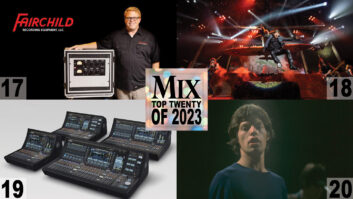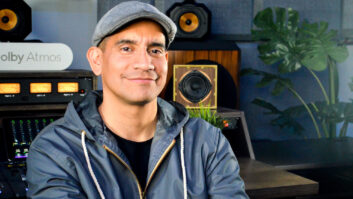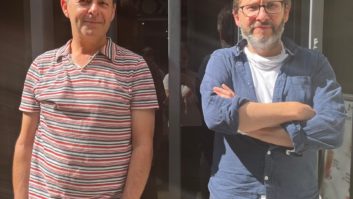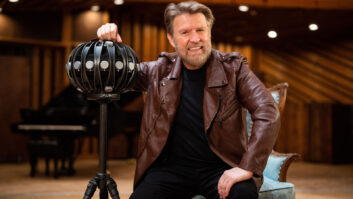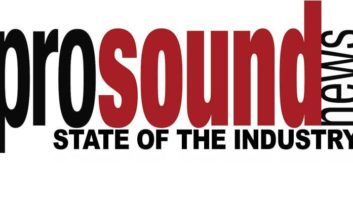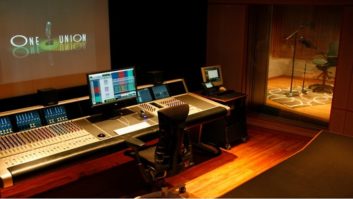The commercial music recording business has continued to evolve at a brisk pace over the past year. Alongside some heartwarming stories of renewal—from the return of Sound City in Southern California to the recent acquisition of New York’s Avatar by Berklee College of Music—some of the most interesting emerging studios increasingly boast new business models and purpose. Professional recording engineers, including those that are studio owners, are diversifying as a whole.
Case in point: JUNO Award-winning producer, engineer, songwriter and mixer Siegfried Meier owns Beach Road Studios, a private recording, mixing and mastering facility overlooking Lake Huron in Ontario, Canada on a sprawling farm. Meier has developed his own series of drum sample kits via MIDI-based libraries, Siegfried Meier Drums; regularly hosts and teaches recording workshops and Pro Tools Certification classes; and is MFIT (Mastered for iTunes) certified. “For students to come out for two days and do the recording workshop with me, it’s focused,” offers Meier with sincerity. “We do 12 to 14 hours each day.”
While diversification is an important consideration for the modern studio owner, the importance of location, as for any business that hosts clients, remains key. GSI Studios, based in midtown Manhattan, is something of a rarity these days thanks to its setting—and that adds to its appeal, according to co-founders Daniel Rovin, Austin White and Eric Harland, starting in 2014. “Our location is about as accessible as it can be,” explains Rovin. “We’re right next to Penn Station and accessible to all boroughs. When we closed our [first] location, the logical step for a lot of people might’ve been moving to Brooklyn, Queens or New Jersey, getting a bigger space for the same amount of money. But for us, the musicians we’re keying in on are coming through New York. Those folks don’t want to go to Brooklyn, Queens or wherever. We live in Brooklyn, so it’s nothing for us to go there, but for artists and major clients? Take Columbia [Records], for instance—they work with us because of our location. Questlove worked with us because of our location; he’s at 30 Rock for The Tonight Show and it’s easy for him to come here to record his podcast. It’s important for us to stay in this area and make [location] one of the main draws. Anywhere else in the world, our studio would be small; here, it’s big.”
Deeper specialization with the intent of unique results and identity is happening, too. In downtown Las Vegas, behind 11th Street Records at the corner of 11th and Fremont streets, National Southwest Recording is a self-professed “rock and roll recording studio” featuring classic and proven gear alongside the modern conveniences bands have come to expect from a commercial studio. Its very design helps cultivate an active local music scene.
“I had started the process of opening a record store,” Ronald Corso, owner of both 11th Street Records and National Southwest, which started out as a home studio owner embedded in the local scene for years. “There was a developer who had a goal of ‘downtown revival’ who basically asked me if I wanted to build a studio in a particular part of town. Opening that kind of studio downtown is more than just a venture; it’s a liability. But the more I thought about it, putting a recording studio in the same place as the record store made a lot of sense. Between artists that were record collectors and the opportunity for scene cultivation in Las Vegas—for example, doing instore appearances for bands—I began to think it could work. Putting those two things together under one roof, both of which are things that are in our consciousness to preserve—studios and record stores—the idea started to come together.”
Meanwhile, many of those in education have responded to recent changes in the recording industry by designing curriculum for a more diversified future in music production, investing in multifunctional studio spaces that can more easily adapt with the times. Though institutions continue to invest in stalwart studio cornerstones—such as large format analog consoles, still a widely preferred means of teaching signal flow—educators realize that students will graduate into a more complex world of audio content creation and thus should be prepared for it. One example of this trend is Capital University of Bexley, Ohio’s Convergent Music Center (CMC), which hosts multi-disciplinary curriculum and real-world experiential learning courses for Music Technology students alongside Radio, Digital Media, Communication and Business students. Interestingly, CMC invested in more traditional tools, such as API’s The Box and many ubiquitous analog processors, alongside its comprehensive AoIP network featuring a Focusrite RedNet system. At the CMC, a central goal of producing well-rounded graduates comes via insight from alumni who shared their experiences with the faculty after a few years in the field.
“We’ve been in communication with our graduates to research program effectiveness, job preparedness and career sustainability,” offers Capital University assistant professor Chad Loughrige. “We’ve found that our graduates require an understanding of multiple technical and skill-based areas. Students are finding jobs where audio production, video editing, composition, lighting and business marketing are all required in their day-to-day responsibilities. Lower budgets and entrepreneurial starts-ups often have employers looking for individuals with skills in all these areas, as they are not able to hire multiple people for all these positions.”
Still, successful studios and their operators continue to thrive because of some simple things, such as what they can uniquely provide their clients. Based outside of Wilmington, NC in New Hanover County, Big Rude Recording was founded by Chase O’Neal, who is keenly aware of the importance of character and vibe in recording environments. As such, Big Rude was conceived to have plenty of it.
“The studio is about 75 yards away from the Cape Fear River,” tells O’Neal. “In the Muscle Shoals documentary, Rick Hall—who co-owned FAME Studios—made a statement about ‘songs in the river,’ and how people were coming there for a particular vibe. Well, when I came up here to see this property for the very first time, the reason why I got past the fact that the building [before renovation] was borderline dilapidated was the vibe of this location. There’s a good feeling where the studio is, with the river and a boat ramp right beside it. If [a client] is frustrated and they need to clear their head for a few minutes, there’s the river.”

